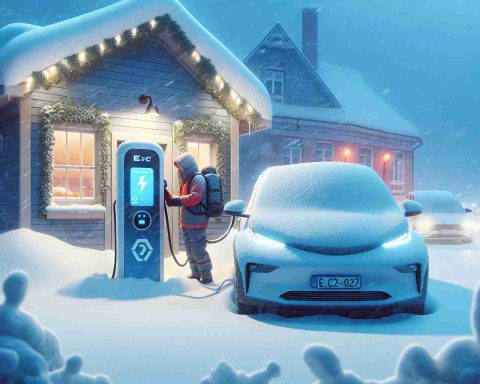Electric Vehicle Sales Soar in 2024
In a remarkable display of electric vehicle (EV) sales, Tesla maintained a commanding lead in the U.S. market last year, outselling the second and third place competitors combined by more than threefold. According to newly released data from Cox Automotive, Tesla sold a total of 633,762 units in 2024, marking a year-over-year sales decline for the first time. Nevertheless, this figure overshadowed the sales of General Motors and Ford, which sold 112,897 and 97,865 EVs, respectively.
The fourth quarter reflected a growing enthusiasm for electric vehicles, with total sales rising by 15.2% compared to the previous year. This surge brought the total number of EVs sold in 2024 to a record 1.3 million. Despite a slight dip of 1.1% in Tesla’s sales from 2023, the brand’s Model Y and Model 3 continued to lead the pack as the top-selling models.
As competition heats up, brands like Hyundai and Kia emerged as significant players, alongside new launches from Honda and GM. Notably, of the 68 evaluated models, 24 experienced increased sales, while some, including the Chevy Bolt, faced a decrease.
Tesla’s unwavering presence in the market underscores its pivotal role as the electric vehicle landscape continues to evolve.
Broader Implications of the Electric Vehicle Surge
The booming electric vehicle (EV) market in 2024 represents far more than a consumer trend; it signals a pivotal shift in societal norms and the global economic landscape. As EV sales reached a record 1.3 million units, the implications touch multiple facets of life, from sustainability practices to economic strategies.
Societal Change: The rise of electric vehicles is reshaping urban planning and transportation infrastructure. Cities are now integrating EV-friendly policies, such as increased charging stations and incentives for sustainable public transport. This shift fosters a cultural reassessment of how society interacts with the environment, urging citizens to adopt more eco-conscious commuting habits.
Economic Impact: The implications extend to job creation in the green technology sector as automakers pivot toward electric manufacturing. As traditional vehicles see reduced demand, employment may shift, necessitating workforce retraining. Growing competition from brands like Hyundai and Kia also hints at a more dynamic global marketplace where innovation fuels economic growth.
Environmental Considerations: While the rise of electric vehicles heralds a reduction in greenhouse gas emissions, the environmental effects of battery production and disposal persist. As EVs become mainstream, the need for sustainable sourcing of lithium and other materials is critical to mitigating ecological harm.
In conclusion, the surge in electric vehicle sales reflects a transformative moment in societal, cultural, and economic spheres, positioning sustainability at the forefront of future development.
Electric Vehicle Market Shifts: What You Need to Know About the 2024 Sales Surge!
The electric vehicle (EV) market has witnessed significant transformations in 2024, characterized by a dynamic landscape of competition and changing consumer preferences. While Tesla continues to dominate, other brands are rapidly stepping up their game, leading to a diverse and competitive marketplace.
Summary of 2024 Electric Vehicle Sales
In 2024, Tesla sold 633,762 EVs, representing a decrease from previous sales figures. However, this total far exceeds competitors General Motors (112,897 units) and Ford (97,865 units), as Tesla outsold both brands combined by more than threefold. Enthusiasm around electric vehicles remained palpable, with total sales rising to a historic high of 1.3 million units, marking a 15.2% increase from 2023.
Key Features of Top-Performing Models
The Tesla Model Y and Model 3 continue to be the best-sellers in the EV category, showcasing superior range, performance, and technology. Key specifications include:
– Tesla Model Y:
– Range: Up to 330 miles
– Acceleration: 0-60 mph in as little as 3.5 seconds
– Tesla Model 3:
– Range: Up to 358 miles
– User-Friendly Interface with Advanced Autopilot Features
Pros and Cons of Electric Vehicles
# Pros:
– Environmental Impact: EVs offer lower emissions compared to traditional gasoline vehicles, contributing to reduced air pollution.
– Cost Savings: Lower fuel costs and reduced maintenance expenses can result in significant savings over time.
# Cons:
– Charging Infrastructure: While improving, the public charging network still lags behind the number of gas stations, sometimes causing range anxiety.
– Upfront Costs: Higher initial prices can be a barrier to many potential buyers, despite long-term savings.
Emerging Competitors
As the EV market heats up, brands such as Hyundai and Kia are becoming recognized contenders, enhancing their offerings with new models. Honda and GM have also entered the fray with innovative launches aimed at capturing the growing market share.
Sales Trends and Innovations
The trend towards electric vehicles is expected to accelerate, driven by consumer demand for sustainable and cost-effective transportation options. Major automotive manufacturers are increasing investment in EV technology, with many planning to release new models in the coming years.
Market Insights and Predictions
Experts predict that Tesla will face increased competition as more companies enter the EV segment, leading to a wider variety of choices for consumers. This diversification may, in turn, spur greater innovation in battery technology, charging capabilities, and overall vehicle functions.
Conclusion
The electric vehicle industry is undergoing a critical phase, with substantial growth in sales and a surge of new entrants seeking to challenge Tesla’s long-held supremacy. As the landscape evolves, it promises exciting developments for consumers and industry stakeholders alike.
For more insights on the electric vehicle revolution and to explore various models, visit Tesla for the latest updates and innovations.












